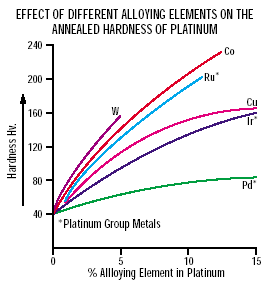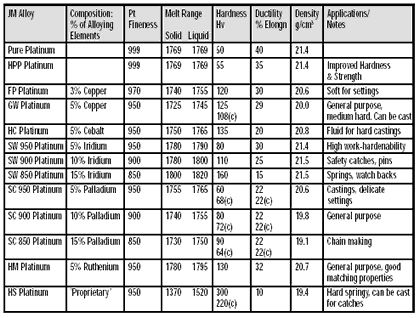Johnson Matthey, one of the world’s largest refiners and fabricators of precious metals, has gained over 150 years experience supplying jewellery manufacturers and craftsmen with gold and platinum alloys of guaranteed quality, and refining their scrap materials. As the world’s largest platinum marketing organisation, Johnson Matthey’s pure platinum pieces and bars have become popular with jewellery manufacturers and investors alike. Extensive research and development has also made Johnson Matthey the forerunners of platinum technology. This expertise has been applied to the jewellery industry to create a range of platinum alloys that enable easy processing from casting to final polishing. Choosing a suitable alloy depends on the market into which it is to be sold and the method used to make the jewellery. For example items suitable for sale in Japan or Germany may not meet the standards of fineness required for hallmarking by the UK assay offices, or by the USA to be sold as “platinum”.
There are some general purpose platinum alloys, but it is best to select one that is suited to casting, handworking or automated production, depending on which is predominant in fabricating the piece. Even a 5% alloy addition can harden or improve castability of platinum but of course, there is considerably more scope if regulations allow greater additions, even if part of that must be platinum group metals.

CASTING
Cobalt and/or palladium have been used to create casting alloys at various levels of fineness Cobalt suppresses oxygen level in the melt, improves fluidity and castability and gives a good final hardness without reducing the melting range significantly. Palladium produces a softer casting.
WROUGHT & HANDWORKING FABRICATION
Copper, cobalt, gold, iridium, palladium and ruthenium alloy easily with platinum. The differences between the alloys reflect the hardening effect of the alloying element itself. Of the platinum group metals ruthenium and iridium have a greater hardening effect than palladium.
AUTOMATED METHODS
Palladium is used when an alloy with a comparatively low rate of work hardening is needed e.g., for high profile stamping To address concerns about working, repairing or re-sizing platinum jewellery and to answer specific technical problems Johnson Matthey have produced two comprehensive manuals: “An Introduction to Platinum” (for Manufacturers) “Tech tips” (for retailers) Both of these are available free from Johnson Matthey in London (UK) by calling +44 (0) 207 2698264 or in New York (USA) by calling +1 212 245 6790

